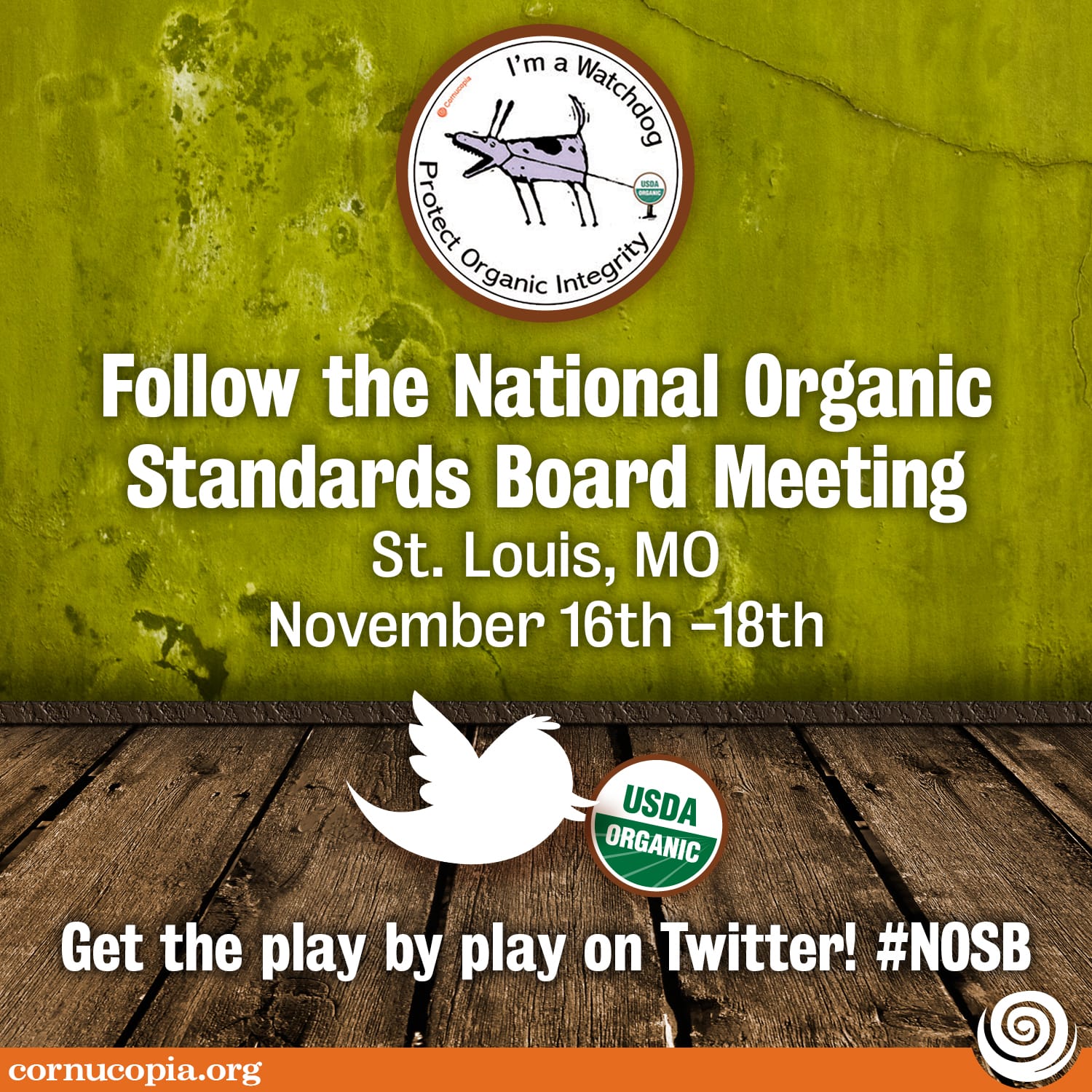 Last Updated: 11-18-16, 5:30 p.m. CT
Last Updated: 11-18-16, 5:30 p.m. CT
Join The Cornucopia Institute as we live tweet from the National Organic Standards Board meeting in St. Louis, Missouri. We will be sharing the play by play with our Twitter followers under #NOSB or simply follow our stream.
If you’re not already following us on Twitter, please do so here.
Read The Cornucopia Institute’s written comments to the NOSB here.
You can also stay updated throughout the meeting right here:
Friday, November 18, 2016
The NOSB meeting has adjourned.
5:18 p.m. CT: As the NOSB prepares to end their semi-annual fall meeting, they elect new board officers for the upcoming year. Tom Chapman (handler rep and Clif Bar employee) is elected chair, Ashley Swaffar (farmer rep) is elected vice-chair and Jessie Buie (farmer rep) is elected board secretary.
4:13 p.m. CT: The petition to add Acid Activated Bentonite to the National List as a poultry litter treatment to control ammonia in poultry houses was also rejected by the NOSB for the same reasons as the previously rejected Sodium Bisulfate petition.
4:06 p.m. CT: The NOSB rejects a petition to add Sodium Bisulfate to the National List as a poultry litter treatment (in the form of the commercial product PLT®) to control ammonia in poultry houses. The vote was unanimous. (It was intended as a topical litter and dirt pad treatment, not for use in feed, food, or drinking water.) The board cited management practices that mitigate its use and natural materials that accomplish the same goal such as citric acid, diatomaceous earth, and montmorillonite clay particles.
3:49 p.m. CT: The NOSB unanimously approves the removal of ivermectin from the National List as a parasiticide in slaughter stock. The board expresses concerns over its harm to dung beetles. There are still two parasiticides allowed for use in organics: moxidectin and fenbendazole.
1:22 p.m. CT: The vote on hydroponics is sent back to subcommittee, maintaining the status quo of hydroponic operations continuing to be certified.
Small independent farmer Emily Oakley opens the conversation addressing two main points. First, the importance of voting on this position today. Since serving on the board, it is the one issue she’s heard over and over again. She says (paraphrased):
We’re at the table today because small soil farmers created this movement. We run a grave risk if we don’t listen to them. The standards are already watered down, and that is an excuse for new farmers not to get certified. We need to address this perception in the public’s mind. The small farmers interact with the consumers through direct marketing, and since they are against hydroponics, this vote will affect organic integrity at the consumer level. The farmer’s pledge in NY is already an example of farmers wanting to go beyond the organic label, and if hydroponics is approved, efforts to move beyond the organic label will dramatically increase.
She is also worried that five new board members are coming in and will not have heard all of the comments that came before them.
Ms. Beck (Driscoll’s employee), Ms. Favre (enviro/conservation rep), Mr. Chapman (handler rep and Clif Bar employee), Ms. Swaffar (farmer rep who didn’t own or operate an organic farm when placed on the board), Mr. Rice (certifier rep), Dr. Richardson (consumer/public interest rep), Mr. Austin (handler rep), Ms. Sonnabend (scientist), and Mr. Buie (farmer rep) voted for the proposal to go back to subcommittee because it is not clear what they are voting on. They claim there is a confusion on definitions such as hydroponic, bioponic, aquaponic, and container production. Ms. Favre is the Executive Director of QAI, a certifier that certifies hydroponics, and Ms. Beck works for Driscoll’s which currently grows produce in hydroponic containers.
Dr. Thicke (enviro/conservation rep), Ms. Behar (environ/conservation rep), Dr. Seitz (consumer/public interest rep), and Ms. Oakley (farmer rep) pushed for it to be voted on today, stating that the organic label is a privilege and that hydroponic growers could use the USDA process verified system to label their products hydroponic or bioponic.
12:09 p.m. CT: Miles McEvoy offered a long discussion on the proposal to allow hydroponics as organic. He concluded by explaining that even a “no” vote today to allow hydroponics would not change the status quo of continuing to allow hydroponic operations because there is no recommendation.
11:59 a.m. CT: As the NOSB moves onto the hotbutton hydroponics issue, the NOP’s Miles McEvoy shares some comments.
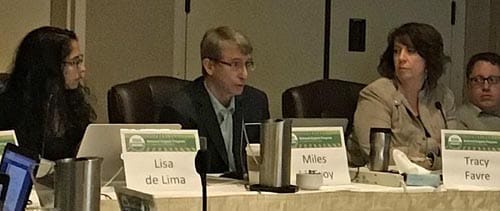 |
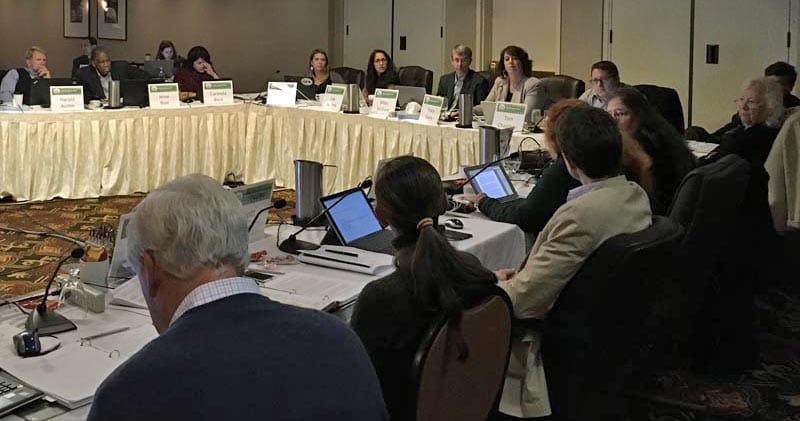 |
11:48 a.m. CT: NOSB rejects petition to utilize Potassium Cellulose Glycolate as a water filtration aid during irrigation and in combination with liquid fertilizers and nutrients. The board questioned its essentiality. Synthetic water filtration materials are incompatible with a system of sustainable agriculture. Natural alternatives and good soil management practices exist, and water use is not an OFPA criteria.
11:44 a.m. CT: The petitions for the inclusion of ammonium citrate and ammonium glycinate on the National List for use as chelating agents were unanimously rejected by the NOSB. The petitioner manufactures liquid micronutrient chelates which are used to provide micronutrients that are readily available to plants in deficient soils.
11:41 a.m. CT: The NOSB rejected a petition to add 1-Methylcyclopropene (1-MCP) to the National List as a post-harvest treatment for apples to delay fruit aging and slow down ripening so that the apples can be stored for a longer period.
The product, as petitioned, is used in sealed storage rooms and breaks down to carbon dioxide and water. The condition of the fruit is improved after it is removed from storage until it reaches consumers.
The material was recommended by Harold Austin, a handler rep and employee of Zirkle Fruit – one of the largest conventional apple growers in the country. He requested that it be sent back to the handling subcommittee for review rather than reviewed by the crops subcommittee. He felt that it is very useful in his conventional operation. Ms. Oakley, a farmer rep, responded that while there are many conventional tools that would be useful for organic farmers, it doesn’t make them appropriate for use in organics.
11:27 a.m. CT: Soy wax was petitioned by Beyond Pesticides as a synthetic substance for use in organic mushroom production to seal plugs and ends of logs inoculated with mushroom spawn. Soy wax is intended to be used for the same purpose as microcrystalline cheesewax (currently on the National List), as a production aid in the production of saprophytic mushrooms grown on logs, however the microcrystalline cheesewax is a petroleum product which doesn’t break down. The NOSB voted not to add soy wax to the National List because there was not enough producer support submitted in written comment.
10:58 a.m. CT: The petition to add aluminum sulfate to the National List for use as a litter amendment to reduce volatilized ammonia in livestock facilities was denied. [Ammonia is naturally produced in litter as manure decomposes: bacteria hydrolyze uric acid to urea, and then to ammonia. Ammonia is a gas, which is detrimental to animal health and performance, and to the health of workers in livestock production facilities. The petition was denied because aluminum can be toxic to plants if the litter was to be added as a soil amendment.]
10:20 a.m. CT: The NOSB crops subcommittee presented a formal discussion document on strengthening the organic seed guidance. For several years now, the Materials/GMO subcommittee of the NOSB has been studying the issue of how to increase the use of certified organic seeds and prevent organic seeds from being contaminated with GMO content.
One point that comes up repeatedly from the organic community is that the progress towards full adoption of organically grown seed in organic systems is too slow, with smaller growers using significantly more certified organic seed than larger growers.
Most farmers still rely on conventional seed, with only 27% of organic growers using 100% organic seed. Growers with vegetable operations of 10 acres or less had on average 75% of their acreage planted in organic seed, whereas growers with over 480 acres had on average only 30% of their acreage planted in organic seed. A desire for certifiers to emphasize the importance of moving completely toward organic seed was expressed because although some varieties aren’t commercially available, often equivalent varieties are.
10:15 a.m. CT: The following materials, pertaining to agricultural crops, up for 2018 Sunset review will remain on the National List for another five years, following votes by the NOSB:
- Copper sulfate used in aquatic rice production to control algae or tadpole shrimp. Because copper sulfate is used in aquatic systems, the current annotations/restrictions include specific requirements for application rates. (unanimously re-approved)
- Ozone gas for use as an irrigation system cleaner only (one board member opposed this based on a lack of updated Technical Review and questions of essentiality)
- Peracetic acid for use in disinfecting equipment, seed, and asexually propagated planting material and to control fire blight bacteria (unanimously re-approved)
- EPA List 3 inerts of unknown toxicity for use in passive pheromone dispensers will remain on the National List, but were also moved onto the list for reviewing all inerts in cooperation with the safer choice program of the Environmental Working Group (unanimously re-approved)
- Calcium chloride, prohibited for use except as a foliar spray to treat a physiological disorder associated with calcium uptake (unanimously re-approved)
9:17 a.m. CT: The NOSB will submit a letter to USDA Secretary Vilsack and the incoming secretary of agriculture under the new administration to provide them more information on their work to eliminate threats from GMO incursion into organic agriculture. The letter calls for compensation to organic farmers from the biotech industry for GMO incursions and contamination on organic farms and for clear leadership from the USDA on this issue.
9:10 a.m. CT: The NOSB makes a decision on the Excluded Methods Terminology Proposal, passing it unanimously. The proposal began four years ago, seeking to update definitions of all methods used to genetically modify organisms such as cell fusion, recombinant DNA technology, RNA silencing, and CRISPR. The proposal the NOSB adopted includes principles and criteria that will be used in the evaluation of new technologies and terminologies.
[GMOs are excluded in organic law due to their unintended consequence in the natural world such as herbicide resistance in weeds and the introduction of genetically modified genes into wild populations, organic crops, and organic seed.]
8:46 a.m. CT: NOSB back in session for the last day of its semi-annual meeting. The board has established research priorities for 2016. These include:
- Evaluation of Methionine in the Context of a Systems Approach in Organic Poultry Production
- Prevention and Management of Parasites
- Biodegradable Biobased Mulch Film
- Alternatives to Copper for Disease and Algae Control
- Plant Disease Management
- Mitigation Measures for Residues in Compost
- Chlorine Materials and Alternatives
- Celery Powder
- Alternatives to Bisphenol A (BPA)
- Consumer Demand
- Fate of genetically engineered plant material in Compost
- Integrity of breeding lines and ways to mitigate small amounts of genetic Presence Prevention of GMO contamination: Evaluation of effectiveness
Thursday, November 17, 2016
6:15 p.m. CT: NOSB votes to keep the non-organic color beta-carotene on the National List. The vote was 8-6, which, under the old Sunset rules, would have led to the removal of this ingredient. [Those rules are the subject of a federal lawsuit brought by Cornucopia and 14 other stakeholders.] Those arguing for the removal of this non-organic color argued that there are enough organic carrots being produced to supply the food color.
6:08 p.m. CT: NOSB voted to keep the following 2018 sunset handling materials on the National List with little debate due to essentiality:
glucono delta-lactone
tartaric acid
cellulose
potassium hydroxide
silicon dioxide
5:03 p.m. CT: Carrageenan is removed from the National List! Before the LONG discussion on whether or not to renew carrageenan on the NL, a presentation was given by the lead on the material, Zea Sonnabend. She summarized over 3,000 public comments on the issue. Commenters included many from the industry that use, sell, and manufacture products containing carrageenan including beer, infant formula, deli meats, capsules, dairy and non-dairy alternatives. Lisa de Lima, retailer representative, testified to the fact that in their stores, all foods are available in organic form without carrageenan except some gel capsules.
Harold Austin, a handler representative, said, “As long as there is a need for any producer for this, I’m going to vote that it stays.” Tom Chapman, another handler representative, feels that this ingredient is eroding consumer trust in the label and would vote to remove. Jean Richardson, envir/conservation rep, said she feels it isn’t necessary.
Ashley Swaffer, a farmer rep, really looked to our consumers. They have responded here, and she will vote to remove, but she is cautious that we are now dependent on other gums. Zea Sonnabend, the board’s scientist, said her personal opinion is that the science does not support concern, and she will abstain from the vote. Francis Thicke, an enviro/conservation rep and an organic farmer, says that they make ice cream in the summer without carrageenan, and their consumers appreciate that.
4:17 p.m. CT: The NOSB handling subcommittee unanimously renews for use in organics for five years the materials agar-agar, animal enzymes, and calcium sulfate.
3:40 p.m. CT: The NOSB next holds a discussion on how to evaluate inspectors and eliminate the incentive to convert native ecosystems into organic crop production.
3:18 p.m. CT: With public testimony over, the NOSB reviews its work and workplan. The NOSB lists several things that the NOP has not taken action on, but that the NOSB has made recommendations on. Some of these include classification of materials guidance, sodium nitrate, EPA list 4 inerts annotation change to work with the safer choice program, zinc sulfate for hoof treatment, apiculture, methionine averaging, and origin of livestock. Says Miles McEvoy, “We have a long regulatory back up and can only get so many things accomplished.”
3:16 p.m. CT: Mark Kastel presented approximately 1,400 individually signed proxies mailed in by farmers in over 40 states and Canada, along with urban allies, to categorically say that we can’t have organic food without organic soil. Kastel asked the board if they were listening to the right stakeholders. Their voting records indicate they are disregarding scientists from public interest groups like Consumers Union, Beyond Pesticides, and Cornucopia. Instead, they are listening to the corporate lobbyists and the Organic Trade Association.
Read Mark’s full comments.
2:56 p.m. CT: Earthbound Farm representative proudly farms 30,000 acres of land and would like to see the hydroponic proposal back to the subcommittee. [Cornucopia contends that the corporate growers are pushing for a delay in the vote to maintain the status quo of certifying hydro operations.]
2:29 p.m. CT: Hydroponics grower John Schultz talks about his operation to the NOSB. Observes Mark Kastel, “Since he calls himself a farmer, this must be a farm.” See below.
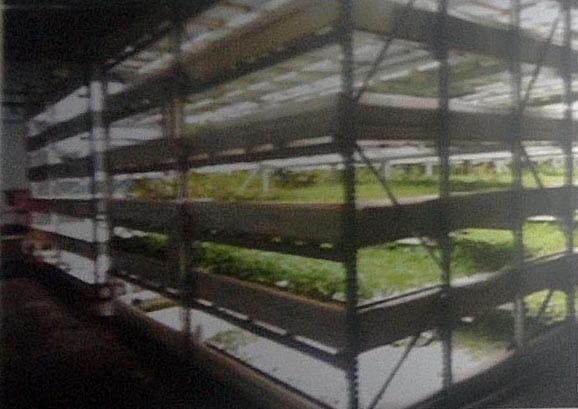 |
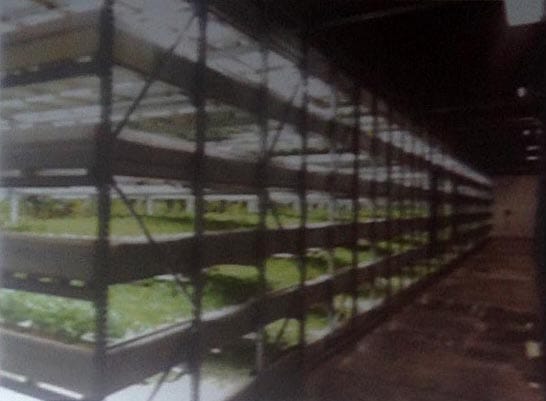 |
2:26 p.m. CT: Lisa Stokke of Food Democracy Now presented 14,000 signatures gathered in 24 hours to the NOSB: “The consumer wants vital, nutritious food grown in nutritious soil.”
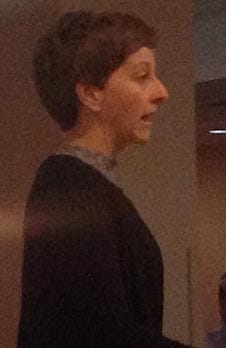 |
2:04 p.m. CT: Julia Barton, representing organic certification agent Ohio Ecological Food and Farm Association, says “In the absence of clear standards, it is not within OEFFA’s purview to certify hydroponic operations, and we have not.”
12:48 p.m. CT: Sam Welsch of the organic certification agency One Cert is asked about container growing. He says when “there’s no soil, there’s no organic.”
12:43 p.m. CT: Cornucopia’s chief scientist, Dr. Linley Dixon, testifies. She tells the NOSB that “the language used in this room is meant to be intentionally misleading. United 4 Food Science is the carrageenan lobby. They are the reason why the science isn’t united on this one. Likewise, container systems using inert media like coco coir and peat moss have always been described in the scientific literature, and by the growers themselves, as hydroponic.”
Read Dr. Dixon’s full testimony.
12:12 p.m. CT: Scott’s Miracle-Gro company representative says that soil is only mentioned in the Organic Foods Production Act in the organic farm plan. He says that it isn’t clear in the regulations that soil-less operations can’t be certified. He lists soy protein and coco coir as some of the hydroponic supplies they sell. [Cornucopia cites both the law and the regulatory sections that point to soil as the basis of organics in its legal complaint.]
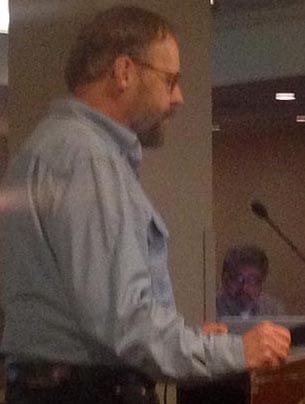 |
12:00 p.m. CT: Dave Colson of Maine Organic Farmers and Gardeners Association testifies that fostering soil fertility as written in the Organic Foods Production Act is a true alternative to conventional agriculture.
11:02 a.m. CT: Colehour Bondera, former NOSB farmer member, tells the NOSB to not put votes off at this meeting – let carrageenan sunset, continue the work on inerts that we have come so far on, and vote now to exclude hydroponics from organics. He says the sunset process (for review of synthetic materials) is now incorporated into the Policy Procedures Manual and should be revisited.
9:45 a.m. CT: Driscoll’s contract berry growers testify that organic farming has been hard, and container growing solves their disease problems. [Cornucopia agrees that it is hard to be a real organic farmer in soil, and real organic farmers should be protected by the law. Read what the law and federal regulations say in our complaint to the USDA.]
9:40 a.m. CT: Eric Asp, CEO of FMC Corporation, states there are no organic alternatives for carrageenan for several beverages including flavored dairy creamers, tubed yogurt, infant formula, and veggie burgers. [Cornucopia has a buyer’s guide listing several of these products that are produced without carrageenan.]
9:29 a.m. CT: Representative from Reiter Affiliated Companies – a giant berry supplier – testifies that container systems for berries provide a more reliable and economically sustainable supply of organic berries [Cornucopia contends that these operations are putting organic farmers abiding by the law out of business – the law defines organic as fostering organic matter in the soil.]
9:20 a.m. CT: NOSB meeting resumes. Public testimony starts again. A Driscoll’s employee testifies in support of container growers. He emphasized that Driscoll’s does not grow themselves, but that he was speaking for their contract growers [Cornucopia is suing the USDA over the fact that NOSB member Carmela Beck – a fulltime employee of Driscoll’s – is sitting in a seat on the NOSB that Congress reserved for someone who “owns or operates” an organic farm. Beck is not a farmer.]
Wednesday, November 16, 2016
6:22 p.m. CT: Robert Rankin of International Food Additives Council and Lori Klopf of ICL Food Specialties cite science that shows carrageenan and phosphates are safe. [Cornucopia argues that industry has funded this science to dispute publically funded results.]
6:15 p.m. CT: Several individuals representing manufacturers of sodium bisulfate support the new petition to add it to the National List of allowed materials in organics for use as a poultry litter material. [Consumer interest groups have argued that this is a material that different production practices, including genetics and humane treatment of the animals, could remediate.]
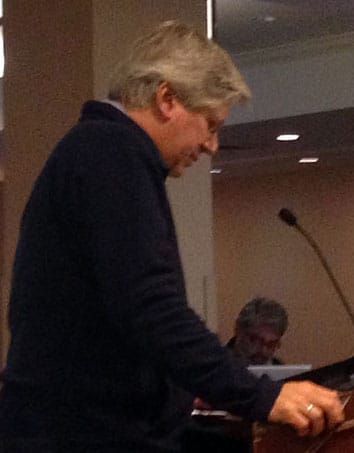 |
6:08 p.m. CT: Jay Feldman of Beyond Pesticides and former NOSB member: The integrity of the organic label requires strong independence on the part of the NOSB. Hydroponics is a good example of this – we need the board at this meeting, AT THIS MEETING, to reaffirm the 2010 NOSB recommendation [they rejected hydroponics as organic].
6:05 p.m. CT: Scott Rangus, former FMC employee (the carrageenan industry) and currently representing Ingredients Solutions LLC, admits that any product can replace carrageenan with something different. But he says that consumers who experience trouble with carrageenan in their diet are not experiencing the effects of carrageenan.
5:49 p.m. CT: Zareb Herman of Hain Celestial Group does not believe that concerns over excess accumulated phosphate consumption is worthy of NOSB time. [Consumers Union cited research that shows harm to human health from cumulative exposure of phosphates in the diet.]
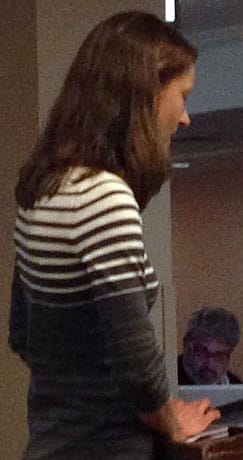 |
Next, a representative of Grocery Manufacturers Association says that carrageenan lacks any hazard to human health and thanks the NOSB for making their decision to remove it from organic food in subcommittee based on a lack of essentiality — not on the fact that it is harmful to organic health. [Cornucopia cites decades of research showing harm to human health].
5:38 p.m. CT: Charlotte Vallaeys of Consumers Union tells the NOSB that even industry-funded research reveals that degraded carrageenan in food-grade carrageenan is known to cause inflammation and ulcerative colitis.
5:16 p.m. CT: Beyond Pesticides’ scientist Terry Shistar: Don’t let the fact that the NOP violated past recommendations of the NOSB in certifying hydroponic containers influence your vote on this issue.
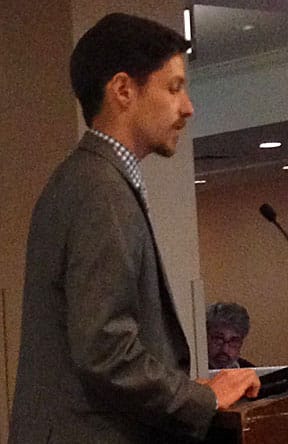 |
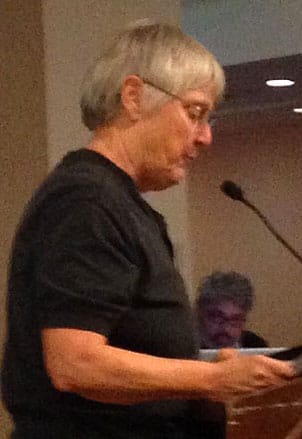 |
5:12 p.m. CT: Cameron Harsh of Center for Food Safety testifies that the carrageenan lobby claims that it is essential, yet products are already on the market that replace it. The amount of research showing a human health concern to carrageenan is enough to practice the precautionary principle and prevent its use in organics.
5:06 p.m. CT: Keith Kandt of Nature Sweet testifies that the voice of the consumer wants organic hydroponics [Nature Sweet is speaking for organic consumers, but doesn’t have any organic production right now].
4:58 p.m. CT: Dupont Seed rep, Mark Cool, testifies that passing the GMO excluded methods document will remove potential tools for organic breeders [Cornucopia’s policy advisor (and head of Organic Seed Growers and Trade Association) Jim Gerritsen testified earlier today in support of passing the excluded methods document].
4:56 p.m. CT: Nate Lewis, for the Organic Trade Association (OTA), says that container systems are different than hydroponics, and OTA encourages the NOSB to send this back to subcommittee. [Cornucopia cites research that identifies container systems using inert media with liquid feeding of nutrients is hydroponic and that delaying the vote on this issue benefits the hydroponic industry.]
3:52 p.m. CT: Nicholas Gardner of the carrageenan lobby group, Marinalg, says “Carrageenan meets OFPA criteria as safe.” [Cornucopia will testify tomorrow that decades of publicly funded research shows biological reactivity in human cells with severe implications for human health.]
3:07 p.m. CT: Cornucopia member David Auner: USDA has failed miserably in the face of corporate corruption to regulate organic food. Please separate hydroponic regulations from organic regulations.
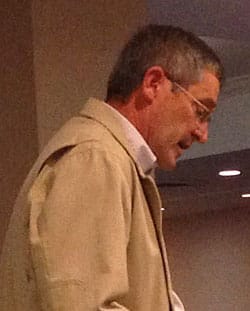 |
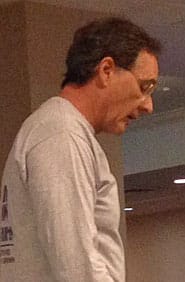 |
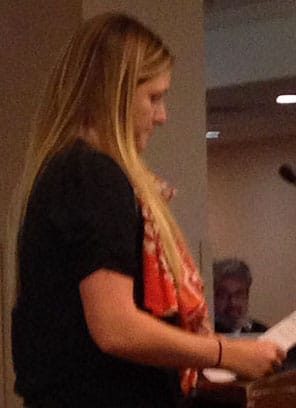 |
3:01 p.m. CT: Anais Beddard of Lady Moon Farm testifies that OFPA states that soil is required. Let’s not fool ourselves: hydroponics = bioponics = container growing. They are all the same–they feed the plant, not the soil. Tom Beddard says, “One of my favorite smells in the world is the smell of organic soil. We organic farmers grow soil. I respectfully ask the NOSB to reaffirm its position that organic is in the soil in the ground.”
2:53 p.m. CT: Lee Frankel, ED for the newly formed hydroponics lobby group Coalition for Sustainable Organics, testifies that container growing is more sustainable. [Cornucopia argues that these systems rely on conventional soy production for fertility, massive amounts of electricity for soy hydrolysis, pumps, and climate control, plastic containers, and peat excavated from wetlands.]
2:49 p.m. CT: The carrageenan lobby talks to the NOSB. Carl Freund, president of Unistraw Corporation, testifies that carrageenan is essential for probiotic drink formulations such as protein shakes.
Susan Finn, president of United 4 Food Science, says that organic products should not be put at a disadvantage from conventional products by removing carrageenan from its products. [Cornucopia addresses the need for carrageenan in products and compelling human health concerns here.]
2:47 p.m. CT: Suzanne McMillan, with ASPCA, requests that animal welfare be addressed from a holistic vantage point. This should include the use of heritage birds with slower growing genetics and greater space per bird, including outdoor access.
2:34 p.m. CT: Robert Hoffman of Shenandoah Growers tells the NOSB that it is much easier to keep food safe in greenhouse container growing.
2:09 p.m. CT: Jo Ann Baumgartner, of Wild Farm Alliance, testifies about concerns with the conversion of high value conservation land to organics. These lands lack a 3 year waiting period typical for conventional farm lands converting to organic production. She presented a new guide, “An organic farmer’s and certifier’s guide to biodiversity conservation,” available on their website.
12:57 p.m. CT: Michael Sleigh, former NOSB member and chair, tells the NOSB that import transaction organic certificates should be required. Hydroponics can currently come into our country where it cannot be sold in the country of origin.
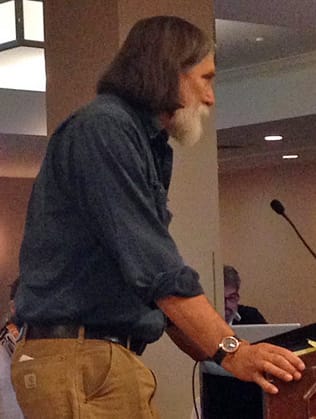 |
12:54 p.m. CT: Jim Gerritsen, the President of the Organic Seed Growers and Trade Association, tells the NOSB that they support the excluded methods proposal on GMOs and believe it should be voted on at this meeting. He mentions that the Agrarian Elders is a group of experienced organic farmers that helped define organic — we are unanimous in our view that organic is in the soil in the ground. Gerritsen asks Miles McEvoy specifically what will the action be if the NOSB votes not to allow hydroponics. McEvoy’s response “The NOSB is an advisory committee only.” Gerritsen further explains that the European Union definition is in the soil in the ground.
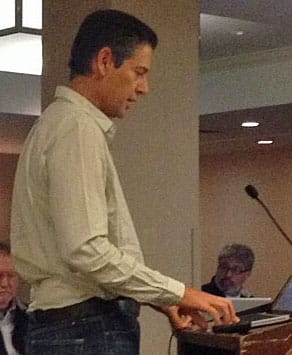 |
representative |
12:39 p.m. CT: A representative from Wholesum Harvest, a huge hydroponics grower based in Arizona, asks for continuing the allowance of organic containers using coco coir and the continuous feeding of liquid amino acids.
12:26 p.m. CT: Paige Tomaselli, Center for Food Safety lawyer, testifies that organic seed is critical to the independence of organic food. Data shows that the largest producers use the least amount of organic seed. She says that the concerns of organic stakeholders surrounding transparency and conflict of interest within the NOSB should be addressed through an open docket.
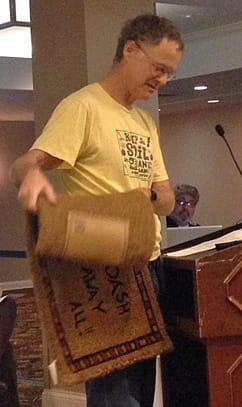 |
holding up coco coir mat used to replace soil in hydroponics |
12:23 p.m. CT: The implication that a small group of Vermont farmers are the only ones that care about this is either wishful thinking or an outright lie, says organic farmer Dave Chapman. Two million farmers and organic representatives have called for a moratorium on hydroponic operations. Hydroponic includes containers grown in an inert medium such as this coco coir mat. There is a lot of push internationally to keep organic organic. Senator Leahy said that ever since OFPA was passed there has been an attempt to undermine the standards. The senator said at the recent farmer rally, “Hydroponic is a fine way to grow, but let organic be organic.”
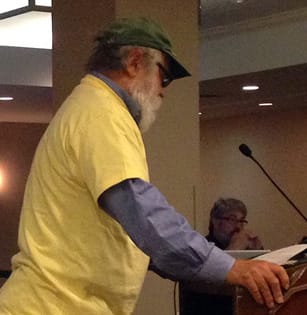 |
keeping soil in organics |
11:48 a.m. CT: Public testimony before the NOSB begins. Vermont organic farmer Davey Miskell testifies that the usual delay tactics of NOP must stop. Davey urges the NOSB to vote now to ban hydroponics at this meeting. The Rally in the Valley footage displays over 100 farmers who want to keep the soil in organic and presentations by Senator Leahy stating that soil was an integral part of the original law.
11:39 a.m. CT: Dr. Dan Seitz, NOSB consumer representative, asks that the individuals writing technical reviews that evaluate materials proposed for use in organics be publicly identified – not just the organization contracted to do the review. NOSB farmer representative Emily Oakley also says that knowing who the individuals are who author technical reviews would help the NOSB understand whether they are qualified to do the work. [Cornucopia currently needs to submit a FOIA to find out who is doing the scientific analysis.]
11:09 a.m. CT: Defending her potential conflict of interest, Ms. Beck insists that Driscoll’s container growing is not hydroponic. [This argument flies in the face of the fact that container systems using inert media, like coco coir and peat moss, have always been described in the scientific literature as hydroponic systems. Container growers themselves (prior to the last year) have called their operations hydroponic.]
11:03 a.m. CT: The NOP discusses conflicts of interest on matters coming before the board. Cornucopia requested that board member Carmela Beck be recused from votes on hydroponics due to a conflict of interest. Beck is an employee of Driscoll’s, one of the largest hydroponic vendors in the country (they are also the subject of a hydroponics legal complaint). Cornucopia’s request quoted from the NOSB’s Policy and Procedures Manual that says conflicts of interest arise when an interest:
- Directly and disproportionally benefits you or a person associated with that member;
- Could impair your objectivity in representing your group; or
- Has the potential to create an unfair competitive advantage.
Furthermore, the board’s manual says that “appearance of a personal conflict and loss of impartiality, while not a true conflict, must be considered when conducting NOSB business.”
The National Organic Program (not the NOSB) rejects Cornucopia’s recusal request.
10:04 a.m. CT: NOP’s McEvoy says next year they will prioritize clear identification of organic imports and an audit trail from farm to market. [The unprecedented surge of cheap “organic” imports of questionable authenticity into the U.S. is pushing American certified organic farmers out of the market.]
9:36 a.m. CT: The NOP’s McEvoy complains to the NOSB that FOIA expenses are increasingly time consuming and take away from core activities.
[Cornucopia has been forced to file lawsuits to obtain public information from the NOP. Some of Cornucopia’s Freedom of Information Act requests (FOIA) are more than 4 years old. The NOP should operate in a more transparent fashion and be more forthcoming with documents the public has a right to. This would shed light on decision making and enforcement activities.]
9:33 a.m. CT: As part of his report to the NOSB, Miles McEvoy says “The NOP is responsible for the integrity of 80 certifying agents worldwide, 31,000 certified operations over 120 countries, over $43 billion in U.S. Organic sales (2015).” The NOP is starting to post enforcement documents on the AMS website. Notable enforcement actions include the case against Yorgo Foods Inc, selling organic produce without a certificate and Saul Farms, selling conventional alfalfa as organic.
[Cornucopia has for years been seeking more information on enforcement actions, as few details have been shared with the public.]
9:19 a.m. ET: Miles McEvoy, Deputy Administrator of the National Organic Program (NOP) announces five new appointees to the National Organic Standards Board. The appointees will serve five-year terms.
The appointees are:
- Joelle Mosso, handler representative, previous manager of strategic quality for Whitewave.
- Sue Baird, consumer representative, ED of the Missouri Organic Association, owns a calf/cow operation
- Asa Bradman, Environmental Protection and Resource Conservation representative, University of CA professor, Organic Center Board of Trustees.
- Steve Ela, Organic Farmer representative, from Hotchkiss Colorado.
- David Mortensen, State College Pennsylvania, scientist representative, professor of weed and applied plant ecology

